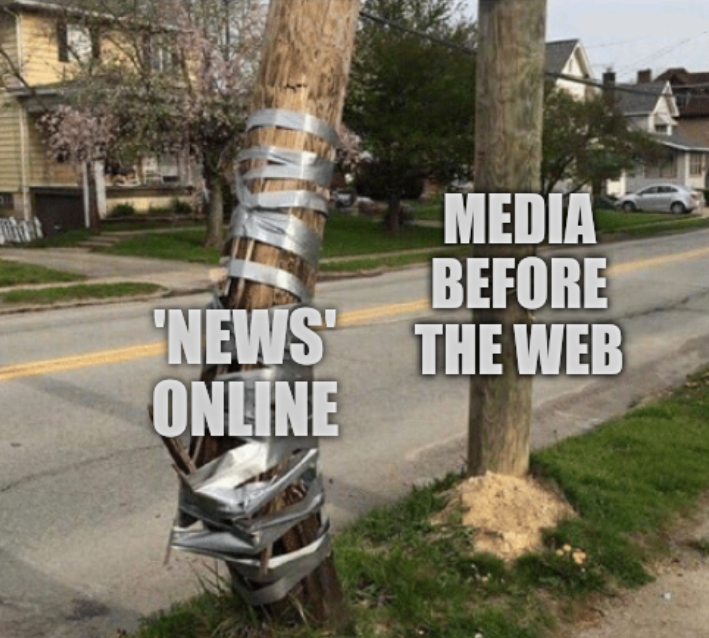Fourth Estate or Missing Fourth Pillar
"The term Fourth Estate or fourth power refers to the press and news media in explicit capacity of reporting the News" -Wikipedia on Fourth Estate
Today or right now it's a Monday morning and earlier than 9AM (CET or even UTC), i.e. the quietest of all times for news-finding (only the far east or Australia publish some things at this time). The "commercial" (or corporate or mainstream) press is asleep even if a lot is happening around the world. They don't get salaried to work on Sundays. Companies like Apple and Microsoft don't pay them to "engage" in marketing at these times (puff pieces or ads disguised as reporting) as the "returns" are diminished when businesses are shut.
Well, we in Techrights always took advantage of these quiet periods to catch up with news and prepare things for the coming week/weeks. This past weekend was no exception and with visitors coming later today we expect to be less active than usual throughout this week, at least online.
When I was younger we had many "Daily" papers (with many subscribers) and some were "weeklies" or weekly editions for weekends. Some of them were large and extensive, published on Sundays (the Sunday Times is still a thing). The "Daily Express" and similar dailies (even more professional ones, like London's own, not the "middle-market newspapers") become less than daily, become trash, eventually perish altogether and get sold to slop-leaning liquidators. Hence, investment in investigative journalists - which can be very expensive - exists no more. Most investigative journalism remains demoted or relegated to freelancers in their own sites, which lack budget and 'name'.
This is a morbid and very sad state of affairs. A lot of what remains of news sites is paid-for stenography for the likes of Microsoft and the front groups, e.g. Linux Foundation. Articles are just some product they buy and pay for. This means that nonprofit interests (hence, little budget) get largely ignored by the media. That's a known issue in general, not a "Linux" issue, but it's still a big issue and it's about tech because of the "online" aspects.
The problem is further worsened or exacerbated in weekends. I recently suggested that we might need to "spread out" picks of news to ensure weekends have remnants of signal (it is a relatively new challenge). An associate explained: "One of the factors slowing the news down is the repetition of syndicated feeds across 'separate' sites, but then some of the sites are less separate than they make out to be. There is basically no local news service any more. For example: https://en.wikipedia.org/wiki/Al.com"
Even when they have unique words (in some cases, only a unique headline), the material covered is almost the same. There's less original material because there are far fewer investigations. What also lessens their incentive to investigate is their unhealthy yet growing dependence on Twitter and Facebook, to name just two Social Control Networks that are basically dying over time. It really kills them all when Twitter becomes "X" and then drowns. Because they foolishly told loyal readers, "follow us in Twitter" instead of advertising something like an RSS feed. To make matters worse, they must also compete with SEO spam and slop - not separate problems (the latter is more like plagiarism). "Xitter and FB helped kill the media," the associate opined. "Their oligarch buddies did the rest."
The inherent anatomy of this isn't hard to see, even in retrospect rather than in real time. Sites were short-sighted and promoted third-party "platforms"; they did not invest in RSS, Atom etc. (before Firefox abolished "live bookmarks" and basically helped Google attack RSS/syndication). GAFAM et al tried to suck journalists out of their site/platform, seducing them into writing "tweets" instead of meaningful articles; then oligarchy came along, deciding to kill the "medium".
So what we have left now is chaos - people who lose their way of keeping track of news, or people who wrongly believe that Elon Musk can be trusted to curate their news. People need to better protect themselves online, knowing there's constantly a war over their minds, not limited to the advertising industry or politics. The Web hasn't been a reliable source of information for a very long time. Literature or the press apparatus moving online got drowned out by "games" like social control media striving for "engagement" rather than facts. With LLM slop thrown into the mix, there's an even growing proportion on the Web that's pure junk, worthless words spewed out by a machine. █




